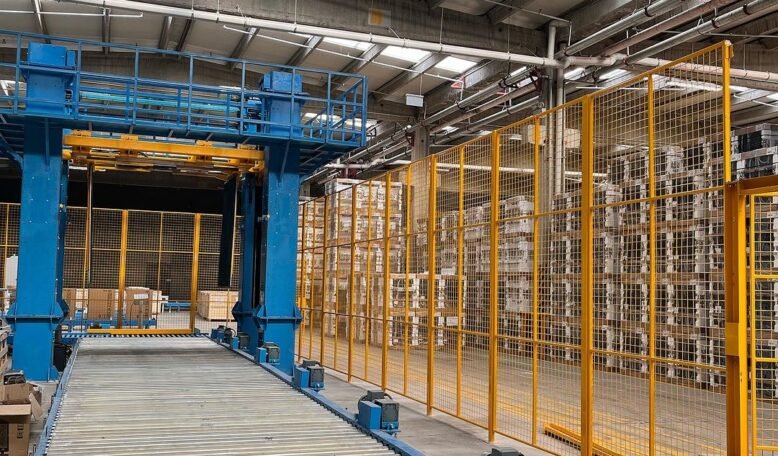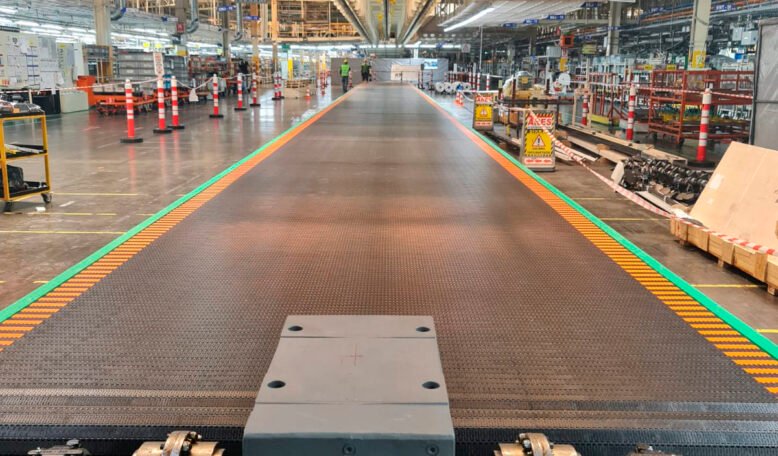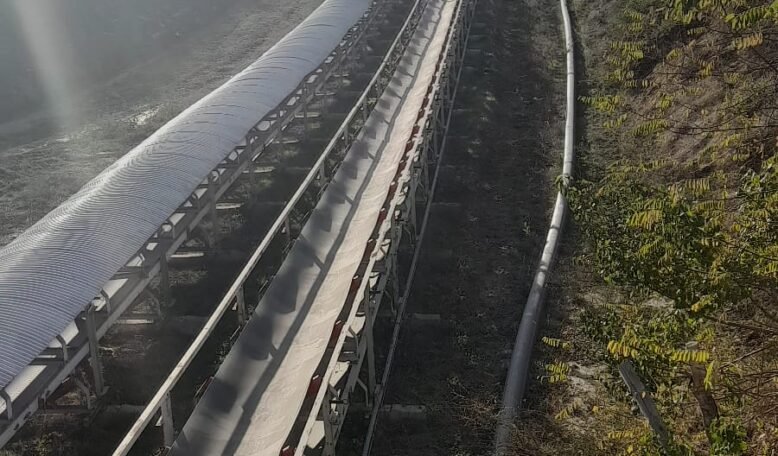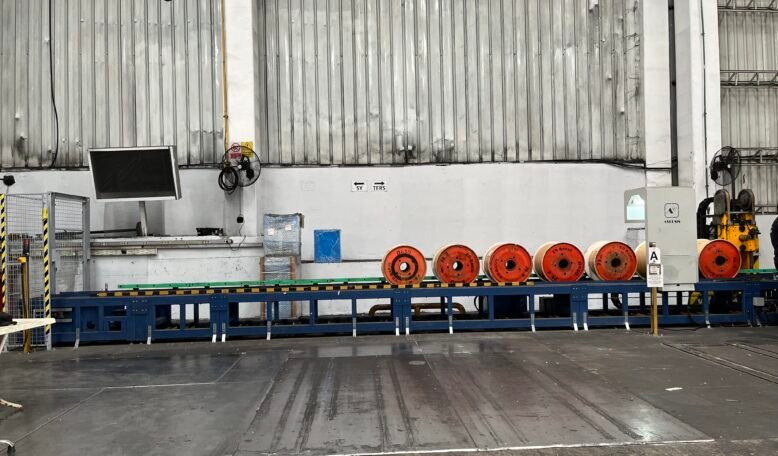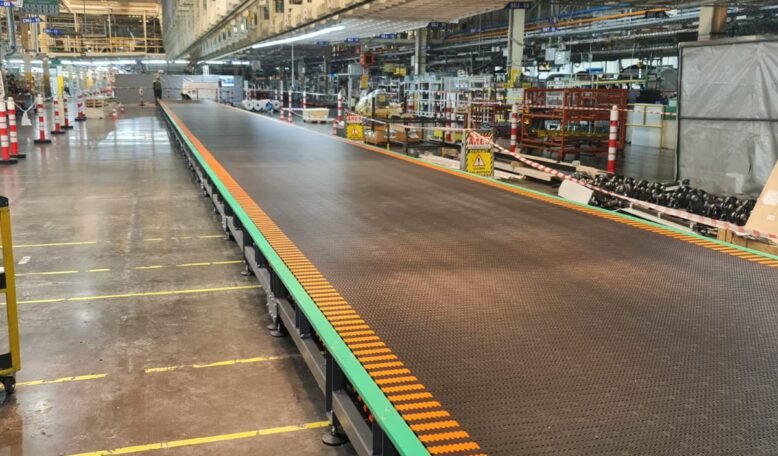
Conveyor Systems And Process Lines
Our conveyor systems are designed to be the heart of Industry 4.0, the fourth industrial revolution that is transforming the manufacturing landscape. Industry 4.0 is characterized by the integration of digital technologies and automation into the manufacturing process, resulting in increased efficiency, improved productivity, and reduced costs.
Our conveyor systems are at the forefront of this revolution, incorporating advanced technologies such as Internet of Things (IoT), artificial intelligence (AI), and machine learning (ML). These technologies enable our conveyor systems to collect and analyze real-time data, optimize production processes, and make intelligent decisions.
With IoT capabilities, our conveyor systems can communicate with other machines and systems in the production line, creating a seamless and interconnected network. This allows for real-time monitoring and control, ensuring that any issues or bottlenecks are quickly identified and addressed.
Furthermore, our conveyor systems are equipped with AI and ML algorithms that can learn and adapt to changing conditions. This means that our systems can continuously optimize their performance, adjusting parameters such as speed, timing, and routing to maximize efficiency and throughput.
But our commitment to innovation doesn’t stop there. We also offer customizable conveyor solutions that can be tailored to the specific needs of our clients. Whether you require a conveyor system for heavy-duty applications, food processing, or pharmaceuticals, we have the expertise and capabilities to design and build a solution that meets your requirements.
Our team of engineers and technicians work closely with our clients to understand their unique challenges and goals. We then leverage our expertise and experience to develop a conveyor system that not only meets their current needs but also provides flexibility for future growth and expansion.
At Steeling, we take pride in delivering high-quality conveyor systems that are not only reliable and efficient but also contribute to the success of our clients’ businesses. With our advanced technologies, customizable solutions, and commitment to innovation, we are the partner of choice for businesses looking to embrace the opportunities offered by Industry 4.0.
When it comes to choosing the right conveyor system for your business, there are several factors to consider. One of the most important considerations is the type of material or product that needs to be transported. For example, if you are dealing with heavy goods, a slat conveyor may be the best option as it is designed to handle heavy loads and provide stability during transportation.
On the other hand, if you are working with smaller items or products that require gentle handling, a modular band conveyor may be more suitable. These conveyors are equipped with modular belts that have a low friction coefficient, ensuring smooth and efficient movement of the products.
For industries that deal with raw materials or products that need to be kept in a controlled environment, such as food or pharmaceuticals, PVC band conveyors are often the preferred choice. These conveyors are made from food-grade materials and can be easily cleaned and sanitized, ensuring compliance with strict hygiene standards.
Accumulation conveyors are ideal for businesses that require a steady flow of products without any gaps or interruptions. These conveyors have the ability to accumulate products and release them in a controlled manner, preventing bottlenecks and ensuring a continuous flow of materials.
In addition to these options, we also offer roller pallet transports, chain pallet transports, modular band pallet transports, and mobile pallet transports. These conveyors are specifically designed for the transportation of palletized goods, making them ideal for industries such as logistics, warehousing, and manufacturing.
When you choose Steeling Partners for your conveyor system needs, you can expect a high level of expertise and professionalism. Our team of engineers and designers will work closely with you to understand your specific requirements and design a conveyor system that meets your needs. We take into consideration factors such as load capacity, speed, space constraints, and safety regulations to ensure that the conveyor system we provide is not only efficient but also safe and reliable.
Furthermore, we understand the importance of after-sales service and support. Our team is available to provide installation, maintenance, and repair services to ensure that your conveyor system operates at its optimal level at all times. We also offer training programs for your staff to ensure that they are equipped with the knowledge and skills to operate and maintain the conveyor system effectively.
With our extensive experience and commitment to customer satisfaction, you can trust Steeling to deliver high-quality conveyor systems that streamline your operations and improve productivity. Contact us today to discuss your conveyor system requirements and let us help you find the perfect solution for your business.
The Benefits of Conveyor Systems
Conveyor systems offer numerous benefits that contribute to the efficiency and effectiveness of production lines. Here are some key advantages:
- Efficient Material Movement: Conveyor systems enable businesses to move materials and products quickly and efficiently, reducing manual labor and increasing productivity. They are particularly useful for moving heavy items, such as cars, down a production line, making them popular in the material handling, packaging, and manufacturing industries.
- Versatility: Conveyors can handle large volumes of parts of various shapes, sizes, and weights. Their adaptability makes them suitable for a wide range of industries, including mining, automotive, agriculture, food and beverage, bottling, manufacturing, warehouse, logistics, and packaging.
- Enhanced Safety: Conveyor systems are equipped with advanced safety features that prevent accidents and injuries. They provide a secure environment for workers while increasing the overall efficiency of the system.
- Elevated Conveying: With elevated conveyors, materials can be safely moved from one level to another, optimizing space utilization and streamlining operations.
- Improved Efficiency: In addition to efficient material movement, conveyor systems also contribute to improved overall efficiency in production lines. By automating the transportation of materials, conveyors eliminate the need for manual handling and reduce the risk of errors or delays. This allows for a smoother and more streamlined workflow, ultimately leading to increased productivity and cost savings for businesses.
- Reduced Labor Costs: With the automation provided by conveyor systems, businesses can significantly reduce their reliance on manual labor. This not only saves costs associated with hiring and training workers but also eliminates the risk of injuries or fatigue-related errors. By reallocating human resources to more complex tasks that require critical thinking and problem-solving, companies can enhance their overall operational efficiency and competitiveness in the market.
- Space Optimization: Conveyor systems are designed to maximize space utilization in production facilities. By utilizing vertical space through elevated conveyors or integrating conveyors into existing infrastructure, businesses can make the most of their available floor space. This allows for better organization and layout of production lines, leading to improved workflow and reduced congestion.
- Consistency and Quality Control: Conveyor systems provide a consistent and controlled environment for the transportation of materials, ensuring that products are handled with care and precision. This helps to maintain the quality and integrity of goods throughout the production process, reducing the risk of damage or defects. By implementing quality control measures along the conveyor system, businesses can monitor and regulate the production line more effectively, resulting in higher customer satisfaction and repeat business.
Maintenance of Conveyor Systems
While conveyor systems offer significant advantages, proper maintenance is essential to ensure their long-term efficiency and reliability. At Steeling, we emphasize the importance of regular maintenance to avoid job loss or disruptions in production, packaging, or delivery processes.
When it comes to maintaining conveyor systems, several key factors should be considered:
- Choosing the Right Conveyor Type: During the installation process, it is crucial to select the appropriate conveyor type that suits the specific layout and requirements of your facility. This ensures optimal performance and minimizes the risk of work disruptions.
- Implementing a Maintenance Schedule: Depending on the type of conveyor system installed, a maintenance schedule should be established and followed diligently. Different types of conveyors require different maintenance procedures, and it is important to pay attention to these specific requirements.
- Preventive Maintenance Approach: Taking a proactive approach to maintenance by performing regular inspections and addressing any potential issues can prevent costly breakdowns and downtime. This approach is more cost-effective than waiting for the system to fail and then dealing with the consequences.
- Adapting to Challenging Conditions: If your conveyor system operates in demanding conditions, such as extreme temperatures, special maintenance procedures may be necessary to ensure optimal operation and longevity.
By prioritizing maintenance and following these guidelines, you can extend the working life of your conveyor systems, minimize downtime, and maximize the return on your investment.
Additionally, it is important to establish a comprehensive maintenance program that includes regular cleaning, lubrication, and inspection of the conveyor system components. This program should be tailored to the specific needs of your facility and take into account factors such as the type of material being transported, the frequency of use, and the environmental conditions.
Regular cleaning of the conveyor system is essential to prevent the buildup of debris, dust, and other contaminants that can cause blockages and reduce the system’s efficiency. This can be done using a combination of manual cleaning methods, such as sweeping and vacuuming, as well as automated cleaning devices specifically designed for conveyor systems.
Lubrication is another critical aspect of conveyor system maintenance. Proper lubrication of moving parts, such as rollers, chains, and bearings, reduces friction and wear, improving the overall performance and lifespan of the system. It is important to use the correct type and amount of lubricant recommended by the manufacturer and to follow a regular lubrication schedule.
In addition to regular cleaning and lubrication, regular inspection of the conveyor system components is necessary to identify any signs of wear, damage, or misalignment. This can help detect potential issues before they escalate into major problems, allowing for timely repairs or replacements. Inspections should cover all components, including belts, pulleys, motors, and control systems.
Furthermore, it is important to train and educate your maintenance staff on the proper procedures for maintaining the conveyor system. This includes providing them with the necessary knowledge and skills to perform routine maintenance tasks, as well as educating them on safety protocols and best practices. Regular training sessions and refresher courses can help ensure that your maintenance team is equipped to handle any maintenance challenges that may arise.
By implementing a comprehensive maintenance program that includes regular cleaning, lubrication, inspection, and staff training, you can ensure the long-term efficiency and reliability of your conveyor system. This will not only minimize downtime and disruptions but also contribute to a safer and more productive work environment.
Partnering with Steeling can provide numerous benefits for your business. Our extensive experience in designing, installing, and maintaining conveyor systems and production lines has allowed us to develop a deep understanding of the industry’s best practices and the specific needs of different businesses.
When you partner with us, you can expect a customized solution that is tailored to your unique requirements. Our team of experts will work closely with you to analyze your current production line, identify areas for improvement, and develop a comprehensive plan to optimize your operations.
One of the key advantages of partnering with Steeling is our commitment to quality. We understand that a well-functioning conveyor system is essential for the smooth operation of your business, and we strive to deliver solutions that are reliable, efficient, and durable. Our team of skilled technicians will ensure that your system is installed correctly and maintained to the highest standards, minimizing downtime and maximizing productivity.
Furthermore, as a global leader in the industry, we have established strong partnerships with top brands such as Toyota, BSH, and Arcelik. These partnerships enable us to access the latest technologies and innovations, ensuring that your conveyor system is equipped with state-of-the-art equipment and software.
At Steeling, we pride ourselves on our exceptional customer service. Our dedicated team is always available to answer your questions, address your concerns, and provide ongoing support. We understand that a successful partnership is built on trust and open communication, and we strive to exceed your expectations at every step of the process.
So, whether you are looking to upgrade your existing conveyor system or implement a new production line, partnering with Steeling will give you the confidence and peace of mind that your project is in capable hands. Contact us today to discuss your requirements and take the first step towards optimizing your production line for maximum efficiency and success.
